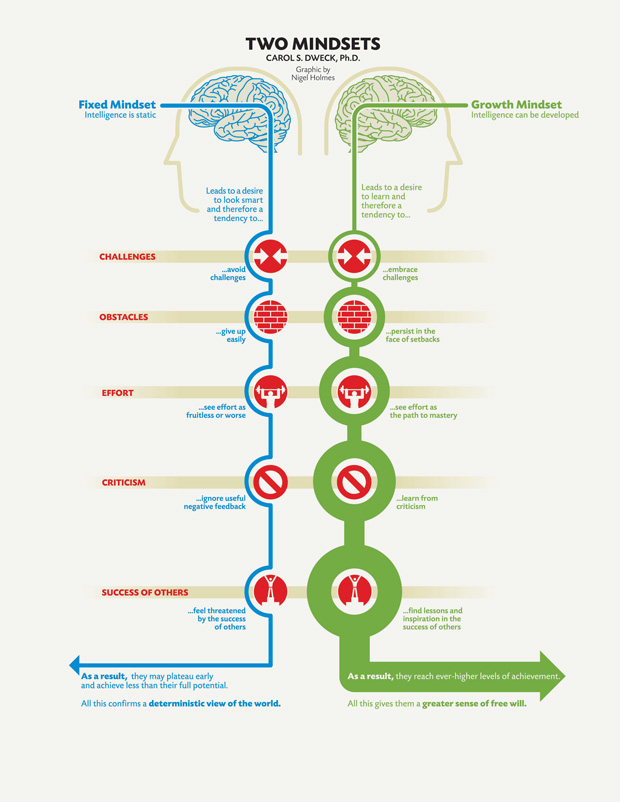Having started at a new school I was fascinated to see that yet again so many students were scared to take risks when it came to writing things down in their booklets, or give up to easily when doing calculations in business – simple maths that would have been covered at GCSE …!
In addition students don’t tend to look up things for themselves or research first, they simply ask the teacher rather than even looking it up in a booklet or online.
Something that I came into contact with first about 2-3 years ago was the concept of the growth and fixed mind-set. Think to yourself which do your students fit into?

Are they willing to challenge themselves? Or do they give up too easily?
Many of my students do fit into the fixed mindset. I only teach A-level and have done for many years, but over those years I have seen the change in students attitude towards the desire or lack of it to learn.
So what as teachers can we do?
Young people these days are so fixated with social media where everything is commented on, where there whole life is lived out for everyone to see, where there is a fear of looking ‘stupid’. This can then transfer to the classroom; they don’t want to put hands up or volunteer to answer questions for fear of making a mistake in front of other people.
A teacher’s role is to create a safe and nurturing environment where students can learn and develop over a period of time. This is something that a teacher needs to be very vocal about with students at the start of the year.
Research has shown that no-one’s mind-set is totally one or the other but developing part of a growth mind-set can help when learning….”a person with growth-mindset feels eager to learn to boost her performance and enjoys exploring, experimenting and stretching herself. She is not sensitive to criticisms and setbacks don’t hurt her so hard.”
But how can we do that in reality?
Few ways that I have tried in the classroom –
- Mini white boards – these are great to allow students to make mistakes – they can complete activities without fear of getting something wrong and making a mess of the booklet or worksheet.
- Use positive language – be very positive about what the student’s do. Check that feedback on homework and tests always comments on something positive, even if they have under-performed.
- Encourage mistakes – as well as white boards, encourage students to have a go before asking the teacher or someone else. Have 3 steps to a task… on your own, with a colleague then ask a teacher.
- Reflection – every homework or test that a student gets back from me has feedback from me but also an opportunity for them to reflect on how they do. Also, as hard as it is, sometimes don’t grade work – just put feedback on… and ask students to reflect on what has been said and take the criticism as a positive.
- Break things down into small steps – ask students to break tasks down into even smaller parts if they feel they cannot cope with, or are overwhelmed by the work they have been given. Don’t give up, but focus on smaller tasks to complete the whole one.
Also whilst teaching encourages students to:
- Concentrate
- Not give up
- Be cooperative
- Be curious
- Have a go
- Use their imagination
- Keep improving
- Enjoy learning
Of course this won’t happen overnight and is definitely something that has to be a work in progress.
Also consider your own attitude and your own mind-set, I for one spent a lot of time when I was younger saying ‘I can’t‘, or ‘I don’t‘ but all of us must have persevered especially with PGCE’s when you first start teaching. Also a growth mind-set with teaching would mean we don’t give up on our students or take their criticism in a negative way… if we can lead by example surely it will help encourage them!
Donna Jestin
Teacher of A Level Business, T&L group researcher, and Principle Examiner for AQA.
Further reading:
http://mindsetonline.com/whatisit/about/
https://www.brainpickings.org/2014/01/29/carol-dweck-mindset/
https://www.brainpickings.org/2014/01/29/carol-dweck-mindset/
http://www.edweek.org/tm/articles/2014/09/17/ctq_stein_growth_mindset.html



